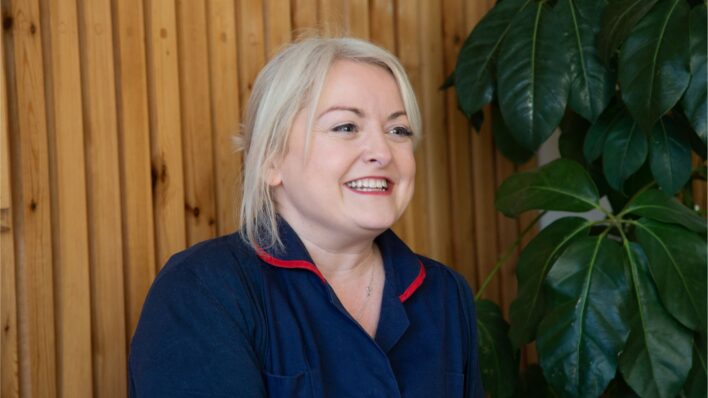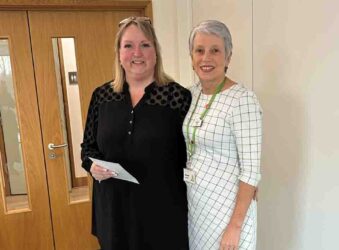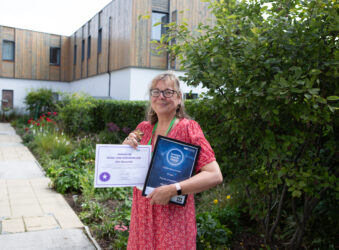Rose Taylor, Clinical Nurse Specialist
Share this story

Rose kindly shared her experience about working at the Charity:
How long have you worked for the Charity?
I’ve officially worked here for over 15 years. I started on the Inpatient Unit and then moved out into the community.
What drew you to hospice care?
I had my first taste of the Hospice in 2005 as a student nurse and I just loved it. I just felt straight away that it was a really special place to be. It felt like it was a space where you could really do your job properly, where you can get to know the patients and their families. I thought that’s what type of nurse I want to be.
When I qualified, I had a year of working on oncology to give me a background and deeper understanding into what patients are going through and then I got back here as soon as I could! I worked as a Staff Nurse on the Inpatient Unit and then as a Ward Sister, and then, when the opportunity came to me reaching the community, I took that as well. The Charity supported me to do my degree in palliative care so that was very supportive.
What makes you proud to be part of the Charity?
Lots of things! I think it’s the way that we really do care for people as individuals and the way that we work altogether. I really like working alongside my colleagues.
What surprises you most about hospice care?
That’s a good question. I’m sure there’s lots of things. I think when people come into a hospice they are surprised at what a warm atmosphere it is. You get a connection with patients but also with your colleagues and it’s a really lovely place to work. If you meet people at parties and tell them what your job is there’s often a bit of silence afterwards but [they don’t realise] it’s often a very cheerful, really warm place to be.
It’s really nice having a Bistro that’s open to the public too. Working in the community, I quite often say to people (when I can tell they’re really petrified of stepping through the doors) ’ why don’t you just come in for a cup of tea’, and then they can see what a nice atmosphere it is.
What would you say to someone about to face hospice care?
I think that stage, when maybe people are moving into hospice care, can be really daunting for people but often it’s also this stage where a bit more control is put back into their hands. When we first meet people we really try to get a sense about what is the most important things for them and then set goals or treatment plans based on that. I think for a lot of people there can be positives that are not always obvious at first.
The families and carers are often the people who are doing the majority of things at home so, it’s working very closely with them. We are going into their environment so you’re seeing how a family works. Every family’s different.
What words would you use to describe the Hospice?
A warm, supportive and welcoming place. I think we all really respect each other as well in the different roles that we play and know that every single one of them is vital. I think it can be really beautiful because I think you often see the most – there are sad times, but I think the best in people comes out in those times and the closeness of the families as well.
Do you have a memory which evokes joy when you think about the Hospice?
Lots! I think from my time working on the Inpatient Unit, they evoke joy and sadness at the same time, but those are the times where we’ve really helped families to be families. We try and do that as much as possible in the community as well and sometimes it’s easier there because people are in their own homes so they’re in a more natural environment. On the Inpatient Unit, I can remember one night when we’d taken a patient into the lounge on their bed. They were quite frail but they were able to watch the X Factor or some finals which was important to them as a family. They had kids on the bed and a takeaway and it’s just those times I think that you know are really important, and it was good that we managed to help them do that. I suppose from the joy angle, a lot of it would be support of colleagues.
Can you think of some of the greatest challenges the Charity has overcome?
I think the last few years [during COVID] spring to mind straight away just because there’s been so much pressure and, in the community, it’s been really difficult. Even just this week, I’ve met people for initial assessments who didn’t present at their doctor’s because either they felt that they wouldn’t be able to get an appointment or they thought, ‘I can’t bother anyone at the moment, this is a national emergency’. So, when they’ve had their first oncology appointment, they’ve already been told it’s palliative. So, things like that and knowing that every service is so pushed. We’ve been doing a lot of things we wouldn’t have traditionally done in the past but with our patients there’s sometimes only a short amount of time to get it right. So you have to go off-plan sometimes just to make it best as you can. I think we’ve really adapted as a service for that to happen. A lot of our team are now prescribers so they can go in and prescribe medications that are needed for patients at end of life and make sure that that happens really quickly. We’re working with the Hospice at Home team to provide some of the fast-track continuing healthcare, like filling in assessments and things like that. I think it makes things more streamlined for patients and means we can get the help to them quicker.
What difference has the palliative care hub made to your role?
It’s been really helpful and we work closely with the team. We have a meeting every morning and generally there’s somebody from the hub there as well so that’s really nice. Just this morning, we discussed a complex patient who I think we might get calls in about and so we plan between us so that we know we can respond quickly if we need to. When I’m on call at the weekends, there’s somebody from the hub on call as well, so we can talk through those tricky cases – it is really nice to have colleagues to share ideas with.
How do you work with the Social Worker?
She’s always really helpful and wonderful because I know I can call up and say, ‘I’m not sure if you can help me here but’ and sort of explain a tricky situation to her and she’ll often have insightful feedback. I think particularly over the last few years we’ve been going into situations more where people weren’t able to access social support. All services are under a lot of strain. I spoke to her last week about a patient that I was concerned about who had some mental health issues and for that reason was really struggling with day to day living, socially and finances – like having heating and getting food. I wanted to support him as much as possible but it wasn’t really specialist palliative care support, so I just needed to know who would be the best people to contact and who could give the best help. It was really good to talk that through and wonderful to get some support with that.
What would you say to somebody who was going to receive hospice care?
One thing I say to a lot of my patients when I first meet them, is it’s really good to be honest about things that might be on your mind. I think firstly palliative care is a relatively new specialism so a lot of people may have different experiences [in the past] , and witnessed the death of a parent or grandparent that weren’t symptom managed or were really quite tricky and there wasn’t the level of care they needed.
People sometime share things that they haven’t voiced in 40 years but I think our imaginations can often be a lot worse than the reality of things. If people feel able to open up and voice their concerns then we can hopefully add that bit of reassurance about what we would do in those different scenarios and how we support people. And also, share what to expect and what not to expect as well because a lot of people think things such as pain are inevitable but actually that’s not necessarily the case – and so I guess it would be about being open to it. The other thing is we don’t push conversations. I will talk to my patients about how far they want to go during our discussions and say to them, ‘we don’t have to talk about this today but if you want to, I’m here.’
View other stories
-

Lorraine Petersen, Medical Director and Consultant in Palliative Care
Lorraine is our Medical Director and Consultant in Palliative Care
-

Hospice Nurse recognised for her courage with a Cavell Courage Award
Anne was presented with a Cavell Courage Award by the Senior Leadership Team
-

Hospice cleaners recognised for ‘treating clients like best friends’
Manoel and Vanessa were awarded the ‘Stars of Atlas’ Award
-

Hospice and Cambridgeshire County Council collaborate
Arthur Rank Hospice Charity collaborate with Cambridgeshire County Council



